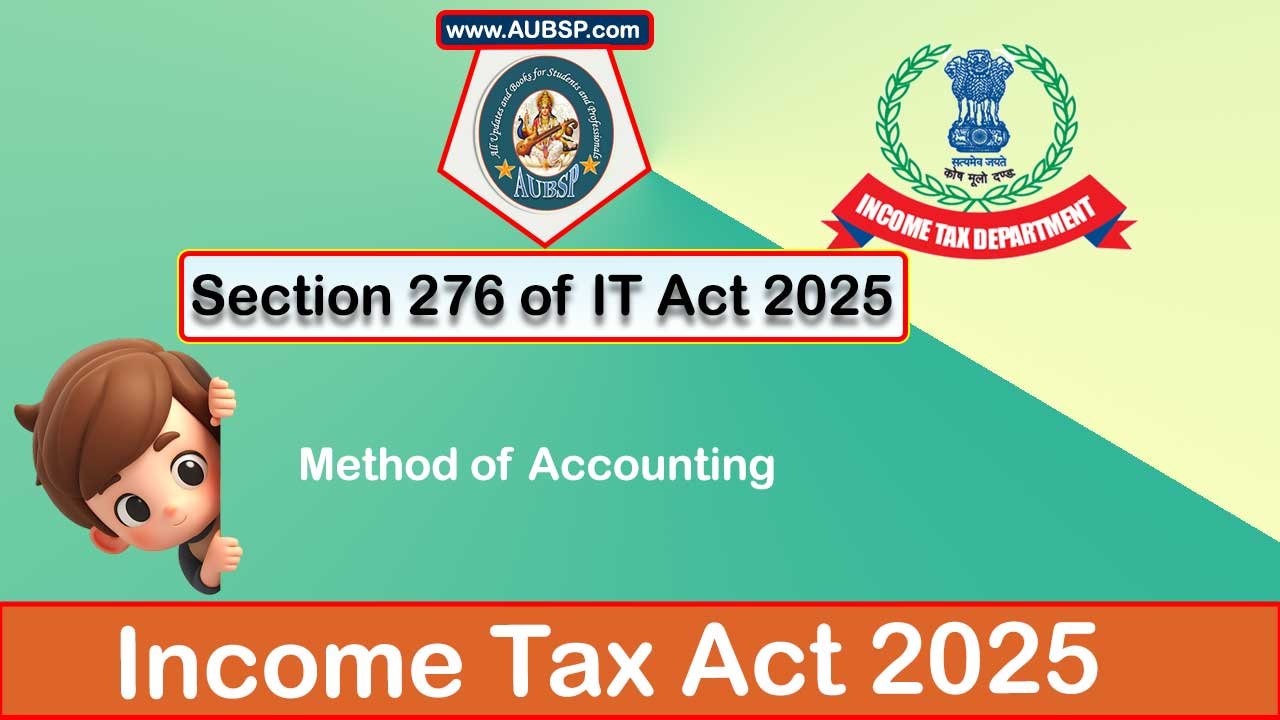Method of accounting
[Section-276 as per the Income Tax Act, 2025 (this Act) w.e.f. 1st April, 2026.]
Section 276(1) of Income Tax Act 2025
276(1) Income chargeable under the head “Profits and gains of business or profession” or “Income from other sources” shall, subject to the provisions of sub-section (2), be computed as per either cash or mercantile system of accounting regularly employed by the assessee.
Section 276(2) of Income Tax Act 2025
276(2) The Central Government may notify income computation and disclosure standards to be followed by any class of assessees or in respect of any class of income.
Section 276(3) of Income Tax Act 2025
276(3) The Assessing Officer may make an assessment in the manner provided in section 271, where––
- (a) he is not satisfied about the correctness or completeness of the accounts of the assessee;
- (b) the method of accounting provided in sub-section (1) has not been regularly followed by the assessee; or
- (c) income has not been computed as per the standards notified under sub-section (2).
FAQs on Section 276 of Income Tax Act 2025
What are the permissible methods of accounting under the Income Tax Act, 2025?
An assessee may use either the cash system or the mercantile system of accounting, provided the method is followed regularly.
Which heads of income require following a method of accounting as per Section 276?
The method of accounting must be followed for computing income under the head “Profits and gains of business or profession” or “Income from other sources”.
Can an assessee change their method of accounting from one year to another?
Only if the change is bona fide and the method is thereafter followed regularly. Inconsistent or irregular changes can result in rejection of books under Section 276(3)(b).
What happens if the assessee does not follow the accounting method regularly?
If the method is not regularly followed, the Assessing Officer may make an assessment under Section 271, as per Section 276(3)(b).
Who is empowered to notify standards related to income computation and disclosure?
The Central Government has the authority to notify Income Computation and Disclosure Standards (ICDS) for specific classes of assessees or incomes under Section 276(2).
Are ICDS mandatory once notified by the Central Government?
Yes, if ICDS are notified for a particular class of assessee or income, they must be followed for computing income.
What happens if the assessee does not compute income as per notified ICDS?
The Assessing Officer may reject the computation and make an assessment as per Section 271, under the authority of Section 276(3)(c).
What if the Assessing Officer is not satisfied with the correctness or completeness of the books of accounts?
In such cases, as per Section 276(3)(a), the AO may reject the books and assess income in the manner provided in Section 271.
Does Section 276 apply to all heads of income?
No, Section 276 applies specifically to “Profits and gains of business or profession” and “Income from other sources”.
Can an assessee follow a mixed method of accounting under this section?
No, Section 276(1) permits only cash or mercantile system—mixed method is not recognized.
Is it mandatory for an assessee to maintain books of account under Section 276?
Section 276 itself does not mandate maintenance of books, but assumes that books are maintained under the cash or mercantile method. Requirements for maintaining books may arise from other provisions.
Can ICDS override the method of accounting followed by the assessee?
Yes, once notified, ICDS will have to be followed for the computation of income even if they differ from the regular method of accounting followed by the assessee.
Is the method of accounting relevant for presumptive taxation schemes?
Section 276 applies only where income is computed under the normal provisions. If income is computed on a presumptive basis, this section may not apply unless specifically stated in the scheme.
How does the AO determine whether the method has been ‘regularly employed’?
The AO checks whether the method of accounting has been consistently followed over the years and is not changed arbitrarily or for tax avoidance.

